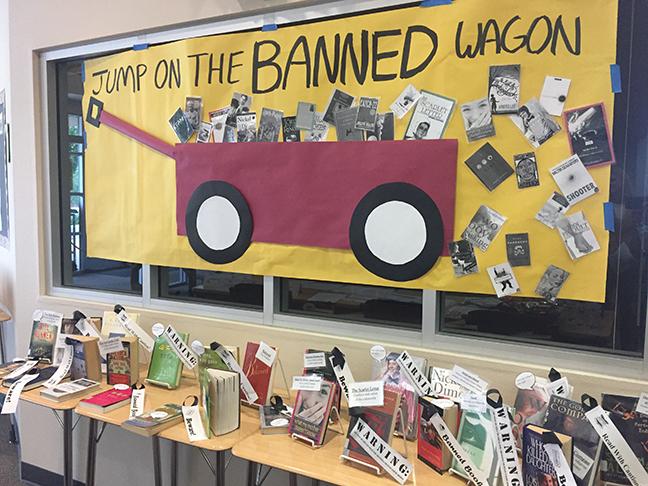Library’s Banned Books Week activities promote awareness
Stacks and shelves line the library to showcase a variety of books students might want to read. But this week, libraries nationwide are focusing their displays on another type of book entirely: titles challenged or considered controversial. As part of Banned Books Week, Sept. 25-Oct. 1, the WHS library is taking part by advertising multiple challenged books in attempt to preserve the integrity of the right to read.
“We are making students aware that they have the right to read books and make decisions for themselves,” Librarian Mrs. Patty Golditch said.
The library is trying to promote the idea of reading challenged books by having multiple banned books on display and contests to engage students throughout the week. On the displays, library staff members have labeled each challenged book, giving the reason it was once challenged. In a special contest involving a shredded banned book, students must guess the title of the book and reflect on what it would be like if they were not able to read a certain book.
By having students read these banned books, the library staff hopes students will create their own perspective on the books to see that not everyone should be limited to the same ideas. Students may not realize that controversy over books can happen locally.
“[In our community] a book by Stephen King with four mini-stories was challenged due to a violent act against a woman. The decision was to choose not to have it,” Golditch said.
Golditch disapproves of the idea to ban books because of how it takes away an opportunity for students to learn. At the high school level, however, she said she respects the decision of parents and wants all of her students to feel safe. Books are challenged for as little as one word or an idea. The purpose of Banned Book Week is to spread the message that authors have the freedom to write and that readers have the freedom to chose the books they read.
“I think it is bad to ban books because people should be exposed to controversial topics to learn from them and to not judge others,” Maddie Papenfuss said.
Popular young adult books like The Hunger Games trilogy and John Green titles “The Fault in Our Stars,” “Looking for Alaska” and “Paper Towns” all appear on commonly challenged or banned book lists. What might surprise students, however, is that a number of books from the standard language arts curriculum are commonly challenged as well, including “The Great Gatsby,” “To Kill a Mockingbird,” “Catcher in the Rye” and “1984.”
Although books may get banned at schools due to parents, students and administrators’ views, including heated presentations at school board meetings or letter-writing campaigns, part of the weeklong Banned Books Week celebration is to recognize that many of these titles have remained available due to the efforts of library and media center specialists, teachers, community members and students passionate about the danger of censorship and the value of standing up for the freedom to read.







![On the stage, Daniel Bozinovski and Rachel Treto play their part as Tom and Hannah in the show “The Cast List”. The show was about a group of students who were told about their cast list for the play “Romeo and Juliet.” The Theater I students were in preparation for their first showcase of the year. Students went over their lines during all of their class for the past two months. “[We put in] a lot of rehearsal, practicing lines, making sure you have everything memorized and making sure you are ready to go in and not forget anything,” Nathan Weeks said. Photo by Megan Kubas.](https://www.whitneyupdate.com/wp-content/uploads/2024/05/IMG_4085-600x396.jpg)
